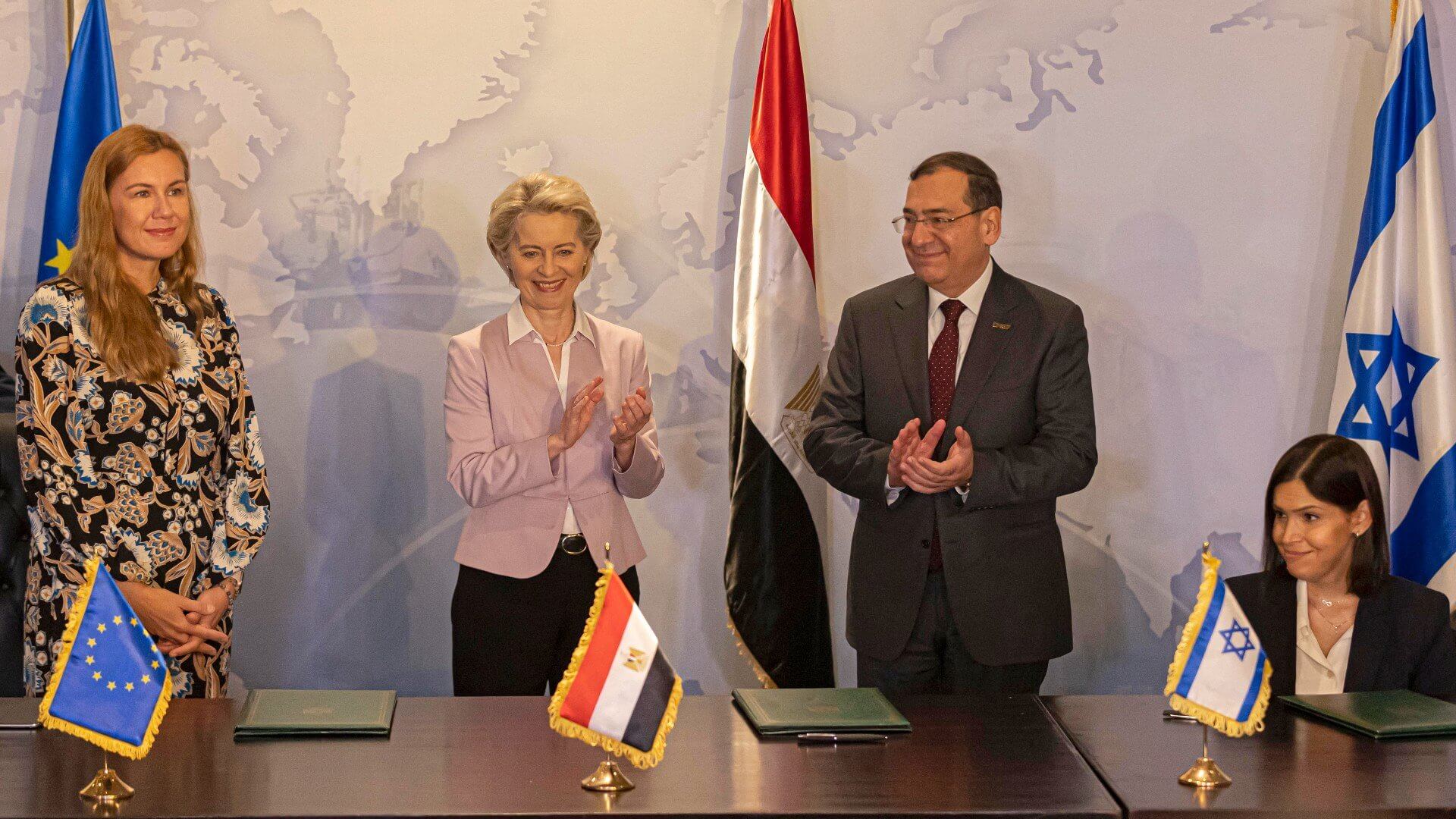The European Union (EU), Israel, and Egypt concluded a deal that will allow Israel to send “significant” exports of natural gas to Europe via Egypt in a bid to reduce the continent’s reliance on Russian gas and perhaps pave way for a “Mediterranean-wide agreement.”
In a joint press statement with Egyptian President Abdel Fattah al-Sisi, European Commission President Ursula von der Leyen celebrated the “historic agreement” as a “special moment,” which she said would advance European energy security.
Speaking of the need to substitute Russian gas supply, she said that the war had resulted in Russia blackmailing Europe through energy by “deliberately cutting off energy supplies.”
We are also partnering with Egypt to improve our security of energy supply and advance towards our global climate goals.
— Ursula von der Leyen (@vonderleyen) June 15, 2022
As chair of COP27, Egypt will play an important role to keep the global community on track.
You can count on my support for a successful COP27 in November. pic.twitter.com/D1Ky9A5TJ9
In fact, the deal was signed just a day after Russian state-owned oil company Gazprom reduced the capacity of the Nord Stream pipeline by 40% due to “repairs,” thereby causing prices to surge by 15%. In fact, Russia has already cut supply to Poland, Bulgaria, Finland, Denmark, and the Netherlands over the last few weeks to retaliate against sanctions and over their refusal to pay in rubles. To this end, von der Leyen said the bloc needed to “diversify to trustworthy suppliers.”
Echoing these sentiments, al-Sisi said that the MOU would help the EU “get rid of its dependency on Russian fossil fuels.”
Furthermore, Egyptian Petroleum Minister Tarek el-Molla said that the deal is “an important milestone” for the three parties and would further bolster cooperation within the East Mediterranean Gas Forum, which comprises Jordan, Israel, Cyprus, Greece, Egypt, the Palestine Authority, France, and Italy.
Israeli Energy Minister Karin Elharrar, too, described the deal as a “tremendous moment,” remarking that it would allow “little Israel” to become a “significant player” in gas. She added that the deal was “historic,” as it enshrines Israel-Egypt cooperation and contradicts those who see the region as one with “only negative forces such as division and conflict.” She noted that the agreement will bring in $290 million into the Israeli treasury.
I am grateful that Israel will increase its supply of energy to the EU.
— Ursula von der Leyen (@vonderleyen) June 14, 2022
Tomorrow we’ll take an important step, with the signing of a trilateral agreement on gas between Israel, the EU and Egypt.
And we will join forces to help protect the world from a major food crisis. pic.twitter.com/N7DRWfj41K
The memorandum of understanding was signed during a meeting in Cairo that saw the participation of European Commission President von der Leyen, Italian Prime Minister Mario Draghi, Egyptian Petroleum Minister el-Molla, and Israeli Foreign Minister Yair Lapid. von der Leyen also held a separate meeting with al-Sisi, just one day after she met Israeli Prime Minister Naftali Bennett in Jerusalem.
The agreement will allow Israeli gas to be brought into Egypt’s LNG terminal via a pipeline, following which it will be liquified and transported to Europe by sea through tankers.
The agreement also highlights the critical role played by natural gas in the EU’s commitment to gradually decrease consumption of fuel until 2050 to meet its zero-emissions target.
In a historic first, Israel 🇮🇱 will be cooperating with Egypt 🇪🇬 and the EU 🇪🇺 to provide natural gas to Europe.
— Naftali Bennett בנט (@naftalibennett) June 15, 2022
We are proud to be contributing to global energy security and a more sustainable future. 🌱🌏 https://t.co/Eu7rM0EOJZ
In 2021, 40% of the EU’s gas was imported from Russia. Since Russia began its military invasion into Ukraine, the EU has been looking to diversify its gas suppliers. It has imposed heavy sanctions on Russia in a bid to punish it for human rights abuses and strain its economy so that it may be compelled to end the Ukraine war. In fact, it recently agreed on a sixth package of sanctions that bans 75% of Russian oil imports and sets a 90% target for the end of the year.
In this respect, von der Leyen said the deal with Israel and Eypt brings about a new sense of “independence.” However, given that its rationale for diversifying energy sources is Russia’s rights abuses, there are questions over whether Egypt and Israel represent the best alternatives, given that both countries also have questionable human rights records.
However, the EU has been expanding cooperation with Israel for months now. In January, it set aside $736 million for the construction of a 2,000-megawatt underwater electricity cable that will link Israel, Cyprus, and Greece.
This is a historic day for the #EU’s energy engagement & #energysecurity: signing the #MoU with #Egypt🇪🇬 & #Israel 🇮🇱, two reliable, strategic partners. We will be able to count on #LNG from Israel & the Mediterranean region via the Egyptian LNG infrastructure. #REPowerEU pic.twitter.com/LcWEaAbjhm
— Kadri Simson (@KadriSimson) June 15, 2022
In 2020, Greece and Cyprus, both EU members, signed an agreement with Israel for a $6 billion underwater gas pipeline, which would account for the 10% of the EU’s gas supply. However, due to political and logistical hurdles, the construction of the pipeline has not yet begun. The United States also criticised the pipeline, saying that it is not an economically viable and efficient alternative to Russian gas.
Nevertheless, over the past few years, Israel has been emerging as a major gas exporter following significant discoveries of two offshore sites with over 690 billion cubic metres of natural gas, one of which lies under its disputed maritime border with Lebanon. Following its peace accord with several Middle Eastern countries, Israel is also looking to collaborate with its allied partners and sell to Europe.

